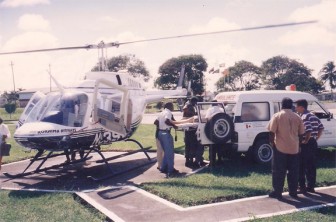Government’s decision to give the green light to the private sector to operate helicopters in Guyana is “a positive development for the aviation industry that is long overdue,” Chief Executive Officer of Roraima Airways Captain Gerry Gouveia has said.
“I am not surprised. The decision by government to allow the commercial use of helicopters by private aviators is really a recognition of the importance of the machine in the context of where the country’s economy is going,” Gouveia said.
According to Gouveia, the decision by government could well see existing aviation companies investing in helicopters. He noted that investments in the energy and mining sectors had given rise to the need for air transport that could fly to remote areas. “It is also likely, given demand for that particular type of air transport, that operators in Trinidad and Tobago, for example—where there are probably 40 companies operating helicopters—might apply for licences to work here,” he added.

Stabroek Business has learnt from a civil aviation source that the decision by government to have privately-owned helicopters work in Guyana resulted in large measure from private sector lobbying, notably by investors in the oil industry.
Gouveia told Stabroek Business that the removal of the restriction now means that the private sector will have to begin to work to build capacity in that particular area of the aviation industry. “In a sense it’s a challenge to the aviation sector since, in the first instance, helicopters are several times more costly to operate than fixed wing aircraft,” he said. “There are also challenges that have to do with finding capable pilots.
“We used to have some but we have lost most of them now. The process of rebuilding will require considerable investment in training, among other things, and it really is a matter of whether the players in the industry might not be focused on other priorities at this time.”
Gouveia said his own company had formerly run a commercial helicopter business from 1995 using a leased helicopter but was forced to wind up its operations in 2005 in view of competition from the Guyana Defence Force (GDF), which operated a commercial service.





